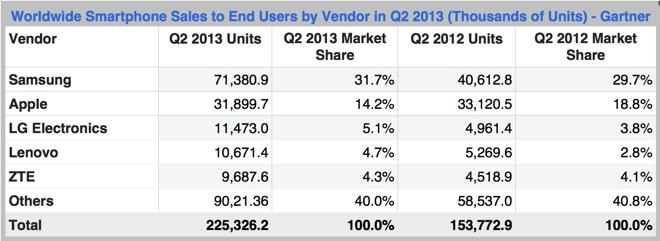Despite moving 3 million more iPhones in the second quarter of 2013 than in the same period last year, Apple's share of the overall smartphone market shank more than 4 percent, while total smartphones outsold feature phones for the first time worldwide, according to new data from research firm Gartner.

Samsung was the chief beneficiary of Apple's decline, according to the new data published on Wednesday, with the Korean electronics giant capturing 31.7 percent of the market. Apple, meanwhile, conceded 4.6 percentage points from the same period a year ago, securing 14.2 percent of smartphone sales to end users, Gartner said.
LG Electronics, another Korean conglomerate, and Chinese companies Lenovo and ZTE also posted gains, taking 5.1 percent, 4.7 percent, and 4.3 percent, respectively. Though iPhone sales grew year over year, Apple's smartphone hasn't been growing as fast as the rest of the market, according to Gartner.
Among mobile operating systems, the Asian companies' advances pushed Google's Android to a commanding 79 percent market share among smartphones sold, followed by 14.2 percent for iOS, 3.3 percent for Microsoft's Windows Phone, and 2.7 percent for BlackBerry OS. Samsung's nascent Bada OS and Nokia's formerly dominant Symbian rounded out the top 5 with less than a percent of the market combined.
The report also suggested that brisk sales of the three-year-old iPhone 4 were responsible for a "significant" drop in the iPhone's average selling price in the second quarter, cautioning that a new low-cost model, rumored to be dubbed the "iPhone 5C," may exacerbate the trend.
"Although the possible new lower-priced device may be priced similarly to the iPhone 4 at $300 to $400, the potential for cannibalization will be much greater than what is seen today with the iPhone 4," Gartner analyst Rashul Gupta said. "Despite being seen as the less expensive sibling of the flagship product, it would represent a new device with the hype of the marketing associated with it."
Apple, however, did see an increase in the company's overall mobile phone market share, from 6.9 percent in the second quarter of 2012 to 7.3 percent in the same period of calendar 2013. The uptick appeared to come chiefly at Nokia's expense, with the Finnish company's share dropping nearly 6 percent thanks to slackening sales of feature phones.
The data released on Wednesday shows that Apple's share of the worldwide smartphone market has continued to slide throughout 2013. Data for the year's first quarter released by Gartner in May showed that Apple had fallen from 22.5 percent of sales to end users in 2012 to 18.2 percent in 2013.
Then, too, Apple's losses were largely the benefit of rival Samsung, which grew from a 27.6 percent market share in the first quarter of 2012 to 30.8 percent in the same three-month period in 2013.


